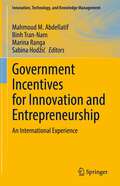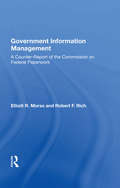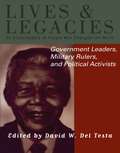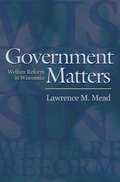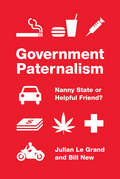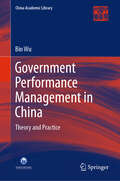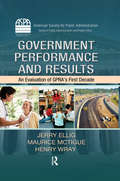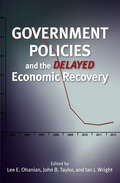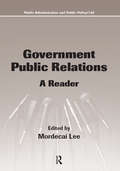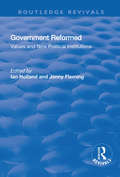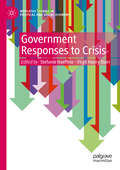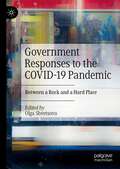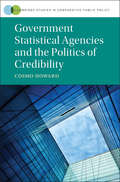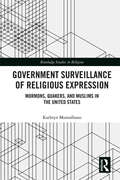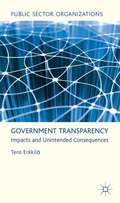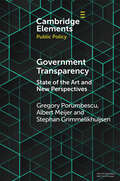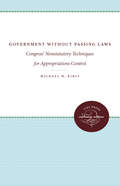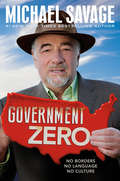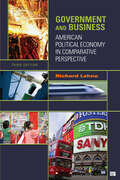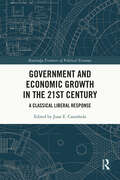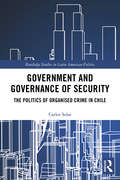- Table View
- List View
Government Incentives for Innovation and Entrepreneurship: An International Experience (Innovation, Technology, and Knowledge Management)
by Marina Ranga Binh Tran-Nam Mahmoud M. Abdellatif Sabina HodžićThis book examines the role of government fiscal and non-fiscal incentives in spurring innovation and entrepreneurship in developed and developing economies. It explores and examines the role of government programs in different stages of firm growth pre-startup, startup, and scale-up. By developing a theoretical framework and reviewing international evidence, the book identifies the best combination of government incentives to stimulate innovation and entrepreneurship, and provides concrete policy recommendations for decision-makers. Some of the issues tackled in this book include national innovation policy, innovation support programs, effectiveness of the support, challenges associated with the programs, risk-sharing and partnerships for innovation. This book is of interest to academics, students, practitioners, policymakers, governmental and non-governmental organizations as well as other stakeholders who wants to be informed about the challenges, progress and current trend in stimulating innovation and entrepreneurship.
Government Information Management: A Counterreport Of The Commission On Federal Paperwork
by Elliott R. MorssIn this timely critique of federal procedures, the authors identify the underlying causes of the current overload of information/paper-work in government and explain why the problem cannot be controlled until the causes are eliminated or neutralized. Using a calcuius they have developed for estimating the "value and "burden of federal information,
Government Leaders, Military Rulers and Political Activists: An Encyclopedia Of People Who Changed The World (Lives And Legacies Ser. #Vol. 3)
by David W. Del TestaIn each volume, an introductory essay outlines of history of the disciplines under discussion, and describes how changes and innovations in these disciplines have affected our lives. The biographies that follow are organized in an A-Z format: each biography is divided into a "life" section describing the individual's life and influences and a "legacy" section summarizing the impact of that individual's work throughout history. These biographies cover a diverse group of men and women from around the globe and throughout history.Franklin Delano Roosevelt, Mao Tse-tung and Genghis Khan are among the 200 well-known historical figures included in this volume. Examples of other lesser-known, yet important, individuals covered in this work are: Gustavas Adolphus, Swedish empire creator; Hatshepsut, queen of ancient Egyptian dynasty; and Jean Jaurès, French socialist leader and pacifist. Each synopsis provides information on each individual's enduring impact on the common understanding of fundamental themes of human existence.
Government Matters: Welfare Reform in Wisconsin
by Lawrence M. Mead"Good government" is commonly seen either as a formidable challenge, a distant dream, or an oxymoron, and yet it is the reason why Wisconsin led America toward welfare reform. In this book, Lawrence Mead shows in depth what the Badger State did and--just as important--how it was done. Wisconsin's welfare reform was the most radical in the country, and it began far earlier than that in most other states. It was the achievement of legislators and administrators who were unusually high-minded and effective by national standards. Their decade-long struggle to overhaul welfare is a gripping story that inspires hope for better solutions to poverty nationwide. Mead shows that Wisconsin succeeded--not just because it did the right things, but because its government was unusually masterful. Politicians collaborated across partisan lines, and administrators showed initiative and creativity in revamping welfare. Although Wisconsin erred at some points, it achieved promising policies, which then had good outcomes in terms of higher employment and reduced dependency. Mead also shows that these lessons hold nationally. It is states with strong good-government traditions, such as Wisconsin, that typically have implemented welfare reform best. Thus, solutions to poverty must finally look past policies and programs to the capacities of government itself. Although governmental quality is uneven across the states, it is also improving, and that bodes well for better antipoverty policies in the future.
Government Paternalism
by Julian Le Grand Bill NewShould governments save people from themselves? Do governments have the right to influence citizens' behavior related to smoking tobacco, eating too much, not saving enough, drinking alcohol, or taking marijuana--or does this create a nanny state, leading to infantilization, demotivation, and breaches in individual autonomy? Looking at examples from both sides of the Atlantic and around the world, Government Paternalism examines the justifications for, and the prevalence of, government involvement and considers when intervention might or might not be acceptable. Building on developments in philosophy, behavioral economics, and psychology, Julian Le Grand and Bill New explore the roles, boundaries, and responsibilities of the government and its citizens.Le Grand and New investigate specific policy areas, including smoking, saving for pensions, and assisted suicide. They discuss legal restrictions on risky behavior, taxation of harmful activities, and subsidies for beneficial activities. And they pay particular attention to "nudge" or libertarian paternalist proposals that try to change the context in which individuals make decisions so that they make the right ones. Le Grand and New argue that individuals often display "reasoning failure": an inability to achieve the ends that they set themselves. Such instances are ideal for paternalistic interventions--for though such interventions might impinge on autonomy, the impact can be outweighed by an improvement in well-being.Government Paternalism rigorously considers whether the state should guide citizen decision making in positive ways and if so, how this should be achieved.
Government Performance Management in China: Theory and Practice (China Academic Library)
by Bin WuThis book explains the basic concepts of the performance management, including the achievement of government goals, management capacity, administrative efficiency and policy effects. Taking Hangzhou, one of the largest cities in China, as an example, the book offers readers a new dimension through which the government can be understood and reformed—performance. Performance management has become an important component of public administration in China, and its use is beneficial in evaluating performance and social benefit. It also incentivizes civil servants to become more motivated and innovative, prevents the development of a bureaucratic atmosphere and facilitates communication between the public sector and the people. The book first introduces the concept of the performance management, providing a detailed description of its history, basic theories and its development. It then discusses the evolution of the system (from objective-based responsibility system evaluation to “vote for excellence”), its three basic areas (performance management on the national, local and municipal levels) and its key components: openness, democracy, accountability and performance. This book allows readers to gain a deeper understanding of the importance of government performance management in China and its contribution to the modernization of state governance and political legitimacy.
Government Performance and Results: An Evaluation of GPRA's First Decade (ASPA Series in Public Administration and Public Policy)
by Jerry Ellig Maurice McTigue Henry WrayThe complexity of governments today makes the accountability desired by citizens difficult to achieve. Written to address performance policies within state and national governments, Government Performance and Results: An Evaluation of GPRA‘s First Decade summarizes lessons learned from a 10-year research project that evaluated performance reports p
Government Pirates: The Assault on Private Property Rights—and How We Can Fight It
by Don CoraceAfter years of hard work and saving, you finally own a home. But don't get too comfortable. If government officials decide they want your property, they can take it—for a wide variety of shady reasons that go far beyond the usual definition of "public purposes." The courts have allowed these injustices to persist. And there is nothing you can do about it—not yet.Real estate developer and property rights expert Don Corace offers the first in-depth look at eminent domain abuse and other government regulations that are strangling the rights of property owners across America. Government Pirates is filled with shocking stories of corrupt politicians, activist judges, entrenched bureaucrats, greedy developers, NIMBY (Not-in-My-Backyard) activists, and environmental extremists who conspire to seize property and extort money and land in return for permits. Corace provides the hard facts about individual rights and offers invaluable advice for those whose property may be in danger. It is the one book that every property owner in America has to read.
Government Policies and the Delayed Economic Recovery
by John B. Taylor Ian Wright Lee E. OhanianThis book examines the reasons for the unprecedented weak recovery following the recent US recession and explores the possibility that government economic policy is the problem. Drawing on empirical research that looks at issues from policy uncertainty to increased regulation, the volume offers a broad-based assessment of how government policies are slowing economic growth and provides a framework for understanding how those policies should change to restore prosperity in America.
Government Public Relations: A Reader (Public Administration and Public Policy)
by Mordecai LeeMuch maligned in the past as wasteful and self-serving, government public relations provides several distinct services that can be used to advance the substantive mission of an agency in ways that save money, time, and effort. In the same manner as budgeting, HR, strategic planning, and performance assessment, public relations must be included in t
Government Reformed: Values and New Political Institutions (Routledge Revivals Ser.)
by Jenny FlemingThis title was first published in 2003. This insightful work examines institutional formation and change as evidence of the major re-shaping of government internationally over the last two decades. It is based on a series of case studies of institutional reform and ranges across institutions in countries including the UK, China, Australia and the USA. Each case study considers questions concerning the establishment of institutions, such as: what have been the objectives of institutional changes? What are the principles and values on which new institutions are founded? In addition to looking at broad hypotheses regarding the state and new institutions, the book also draws together practical lessons regarding institutional reform. Thus the cases are analysed as a group to throw light on a number of issues: are there patterns discernible in the formation of new political institutions? What do the cases reveal about what works, and what does not work, in forming new institutions? What predictions can be made about the relationship between values and governance structures?
Government Responses to Crisis (Mercatus Studies in Political and Social Economy)
by Virgil Henry Storr Stefanie HaeffeleWhen crises occur, citizens, media and policymakers alike expect government to respond and to take a leading role in recovery. Given the scale and scope of crises, whether natural (such as hurricanes, floods, and earthquakes), manmade (such as conflict and economic downturns), or often a combination of the two, governments are often seen as being in the best position to identify the problems, understand the circumstances, and direct action. They are also likely to be the entities that have adequate resources to devote to such large-scale efforts. Yet, governments are not spared from the effects of crises. They are composed of individuals who are impacted by disasters and face many of the same challenges in identifying needs, prioritizing action, and adjusting to changing circumstances. It is by no surprise that governments are also often scrutinized during and after crises. How, then, do we understand the capability of and proper role for governments to respond to crisis and to drive recovery? This edited volume—comprised of chapters by accomplished scholars and seasoned practitioners in disaster and crises studies and management, spanning multiple disciplines including sociology, economics, and public administration—examines the roles, expectations, and capabilities of government responses to crises. It gives an overview of the literature, provides lessons learned from both research and experience on the ground during crises, and puts forth a framework for understanding crisis management and subsequent policy implications. It will be of use to any scholars, students, practitioners or policymakers interested in learning from and better preparing for crises and responding when they do occur.
Government Responses to the COVID-19 Pandemic: Between a Rock and a Hard Place
by Olga ShvetsovaThis book examines how governments around the world responded to the health emergency created by the COVID-19 pandemic. Before vaccines became available, non-medical interventions were the main means to protect the public. Non-medical interventions were put in place by governments as public health policies. In every nation, politicians and governments faced a choice situation, and worldwide, they made different choices. Public health policies came at a price, in economic, social, and ultimately electoral costs to the political incumbents. The book discusses differences in governments’ policy efforts to mitigate the virus spread. The authors conduct in-depth analysis of country-cases from Africa, North and South America, Asia, and Europe. They also offer small-n- comparative analyses as well as report global patterns and trends of governments’ responsiveness to the medical emergency. It will appeal to all those interested in public policy, health policy and governance.
Government Size and Output Volatility: Should We Forsake Automatic Stabilization?
by Xavier Debrun Jean Pisani-Ferry André SapirA report from the International Monetary Fund.
Government Statistical Agencies and the Politics of Credibility (Cambridge Studies in Comparative Public Policy)
by Cosmo Wyndham HowardWho decides how official statistics are produced? Do politicians have control or are key decisions left to statisticians in independent statistical agencies? Interviews with statisticians in Australia, Canada, Sweden, the UK and the USA were conducted to get insider perspectives on the nature of decision making in government statistical administration. While the popular adage suggests there are 'lies, damned lies and statistics', this research shows that official statistics in liberal democracies are far from mistruths; they are consistently insulated from direct political interference. Yet, a range of subtle pressures and tensions exist that governments and statisticians must manage. The power over statistics is distributed differently in different countries, and this book explains why. Differences in decision-making powers across countries are the result of shifting pressures politicians and statisticians face to be credible, and the different national contexts that provide distinctive institutional settings for the production of government numbers.
Government Surveillance of Religious Expression: Mormons, Quakers, and Muslims in the United States (Routledge Studies in Religion)
by Kathryn MontalbanoRecent revelations about government surveillance of citizens have led to questions about whether there should be better defined boundaries around privacy. Should government officials have the right to specifically target certain groups for extended surveillance? United States municipal, territorial, and federal agencies have investigated religious groups since the nineteenth century. While critics of contemporary mass surveillance tend to invoke the infringement of privacy, the mutual protection of religion and public expression by the First Amendment positions them, along with religious expression, comfortably within in the public sphere.This book analyzes government monitoring of Mormons of the Territory of Utah in the 1870s and 1880s for polygamy, Quakers of the American Friends Service Committee (AFSC) from the 1940s to the 1960s for communist infiltration, and Muslims of Brooklyn, New York, from 2002 to 2013 for suspected terrorism. Government agencies in these case studies attempted to understand how their religious beliefs might shape their actions in the public sphere. It follows that government agents did not just observe these communities, but they probed precisely what constituted religion itself alongside shifting legal and political definitions relative to their respective time periods. Together, these case studies form a new framework for discussions of the historical and contemporary monitoring of religion. They show that government surveillance is less predictable and monolithic than we might assume. Therefore, this book will be of great interest to scholars of United States religion, history, and politics, as well as surveillance and communication studies.
Government Transparency: Impacts and Unintended Consequences (Public Sector Organizations)
by Tero ErkkiläTransparency has become a global concept of responsible government. This book argues that the transnational discourse of transparency promotes potentially contradictory policy ideas that can lead to unintended consequences. It critically examines whether or not increased transparency really leads to increased democratic accountability.
Government Transparency: State of the Art and New Perspectives (Elements in Public Policy)
by Albert Meijer Gregory Porumbescu Stephan GrimmelikhuijsenThis Element argues that to understand why transparency “works” in one context, but fails in another, we have to take into account how institutional (macro), organizational (meso) contexts interact with individual behavior (micro). A review of research from each of these perspectives shows that the big promises thought to accompany greater transparency during the first two decades of the 20th century have not been delivered. For example, transparency does not necessarily lead to better government performance and more trust in government. At the same time, transparency is still a hallmark of democratic governance and as this book highlights, for instance, transparency has been relatively successful in combating government corruption. Finally, by explicitly taking a multilayered perspective into account, this Element develops new paths for future research.
Government Unions and the Bankrupting of America
by Daniel DisalvoGovernment-workers unions have been political juggernauts in the U.S. since the unseen collective-bargaining-rights revolution of the 1960s and '70s. These unions are different and more powerful than those that battle owners and managers in the private sector. To advance their interests, unions in the public sector have created cartels with their political allies, mostly in the Democratic Party, to the exclusion of the taxpaying public.In this Broadside, Daniel DiSalvo shows us how this government takeover happened and tells us what can be done to protect the public interest. The fiscal consequences have already proven dire and threaten the long-term power and prestige of the United States on the world stage.
Government Without Passing Laws: Congress' Nonstatutory Techniques for Appropriations Control
by Michael W. KirstThis book demonstrates both the limits and unique role of non statutory controls in a world that demands a flexible administrative response that might be overly constrained by rigid statutes. It also explains that nature and impact of congressional involvement through non statutory controls.Originally published 1969.A UNC Press Enduring Edition -- UNC Press Enduring Editions use the latest in digital technology to make available again books from our distinguished backlist that were previously out of print. These editions are published unaltered from the original, and are presented in affordable paperback formats, bringing readers both historical and cultural value.
Government Zero: No Borders, No Language, No Culture
by Michael SavageFrom bestselling author of Stop the Coming Civil War, Michael Savage reveals the massive dangers currently leading to the demise of our government.Michael Savage has been warning Americans for decades and now it's here. In GOVERNMENT ZERO: No Borders, No Language, No Culture, Savage sounds the alarm about how progressives and radical Islamists are each unwittingly working towards similar ends: to destroy Western Civilization and remake it in their own respective images. These two dark forces are transforming our once-free republic into a socialist, Third World dictatorship ruled by Government Zero: absolute government and zero representation. Combining in-depth analysis with biting commentary, Savage cuts through mainstream media propaganda to reveal an all-out attack on our borders, language and culture by progressive travelers who have hijacked public policy from national defense to immigration to public education. Find out everything you need to know about this terrifying agenda to weaken the U.S. military, cripple the American economy, subvert basic American liberties such as freedom of speech, and destroy the international world order. There is no time to lose. The Progressive-Islamist agenda has advanced into every public space, from the White House to the military to your local public school. If America is to survive, it has to be stopped. Michael Savage has a plan. Get the inside story before it's too late.
Government and Business: American Political Economy in Comparative Perspective
by Richard LehneIn the wake of worldwide economic turmoil and efforts toward recovery, understanding the interdependence of government and business is more important than ever. In this thoroughly updated edition, Lehne takes a comparative approach, evaluating the U.S. political economy with respect to those of Great Britain, Germany, Japan, and the EU. The book provides detailed historical context for, and a conceptual understanding of, the business-government environment, and then clarifies the roles of the major actors and outlines the regulatory and policy frameworks. Along the way, Lehne probes some of the most crucial dilemmas facing government and business today. Updates to this edition include:• expanded coverage of ethics as it relates to government and business;• greater attention to China in particular in the feature boxes on developing nations; and• a look at relations between government and business at the subnational level. A comprehensive glossary and chapter summaries enhance student learning.
Government and Economic Growth in the 21st Century: A Classical Liberal Response (Routledge Frontiers of Political Economy)
by Juan E. CastañedaThis book offers an alternative view of the economy – and indeed, society – that does not rely on an ever-expanding government to address the problems which individuals typically face during their lives.The book is a Classical Liberal response to the way leading economies have been (mis)managed in the last three decades and the principles and models that have guided such policies, particularly since the outbreak of the Global Financial Crisis in 2007–09, which has resulted in enlarged government deficits and public debt, as well as more intrusive government regulation and virtually no economic growth. The book does not only criticise the current dominant view which favours ever-growing governments but also puts forward an alternative set of policies and institutions compatible with long-term growth in a free(er) economy. The book is structured around three major themes: (1) what classical liberalism is (or should be) and why it still matters, (2) how state-sponsored capitalism hinders the well-functioning of the market economy as well as being a bad recipe for economic growth and individual freedom, and (3) which are the essential Classical Liberal institutions necessary for a free market economy to flourish.This volume will be accessible not only to specialists in the subject but also to a well-informed audience interested in current economic issues, the role of government in the economy, and how history, traditions, the political system, and economics shape the institutions that help us to explain how markets function and their outcomes.
Government and Governance of Security: The Politics of Organised Crime in Chile (Routledge Studies in Latin American Politics)
by Carlos SolarAt a time when Latin America is experiencing societal unrest from human rights violations, corruption and weak institutions Government and Governance of Security offers an insightful understanding for the modern steering of crime policies. Using Chile as a case study, the book delivers an untold account of the trade-offs between political, judicial and policing institutions put in practice to confront organised crime since the country’s redemocratisation. In an effort to encompass the academic fields of political science, public policy and criminology, Carlos Solar challenges the current orthodoxies for understanding security and the promotion of the rule of law in developing states. His research aptly illuminates the practicalities of present-day governance and investigates how networks of institutions are formed and sustained across time and, subsequently, how these actors deal with issues of policy consensus and cooperation. To unveil the uniqueness of this on-the-ground action, the analysis is based on an extensive revision of public documents, legislation, media accounts and interviews conducted by the author with the key policy makers and officials dealing with crimes including drug-trafficking, money laundering and human smuggling. Government and Governance of Security will be of interest to scholars of Latin American studies, security and governance and development.
